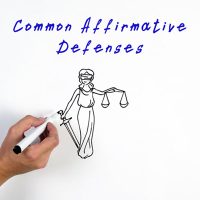Affirmative Defenses And Florida Criminal Law

Proving that you did not commit a crime is a tall order, indeed. This is why courts do not require defendants to prove their innocence in order to secure a verdict of not guilty in a criminal case. Instead, they must only show that there is reasonable doubt about the veracity of the accusations that the prosecution is making against them. Of course, this is not an especially simple task, either. It is much simpler to admit that you took the money, transported the drugs, punched the person who is accusing you of punching him, or did whatever else the prosecution alleges that you did. Thus, most pleas in criminal court are guilty pleas, although these are sometimes motivated by the promise of a lighter sentence and not merely by the difficulty of demonstrating reasonable doubt. In some cases, it is possible to acknowledge that you committed an action that, at first glance, appears to be a crime, but then to argue that circumstances preclude your actions from fitting the definition of the criminal offense in question. These are called affirmative defenses. To find out which affirmative defenses, if any, are applicable to your case, contact a Tampa criminal defense lawyer.
Can Admitting That You Did It Get You Acquitted?
The common theme of affirmative defenses is that you are saying, “I did it, but I’m not guilty.” The following are examples of affirmative defenses. The following are examples of affirmative defenses:
- If the crime involves doing X without the victim’s consent, you can argue that the alleged victim gave consent. In sex crime cases, this means that the sexual act was consensual and that you reasonably believed that the alleged victim was legally able to give consent. In theft and financial crime cases, it means that the alleged victim gave you permission to take the allegedly stolen property or to make the transaction.
- You can argue that you committed the action under duress, which means that someone threatened you with violence or legal action if you refused to do it. For example, you can argue that a drug kingpin coerced you into participating in a drug trafficking operation. If you are accused of engaging in commercial sex and you claim that you are a victim of human trafficking, this is an example of the duress defense.
- It is possible to be acquitted of violent crime charges if you acted in self-defense, meaning that you committed the act of violence in order to avert an immediate threat of death or serious injury.
- Although this defense is not very common in practice, it is possible to claim that you did not understand your actions because of a mental illness, disability, or involuntary intoxication.
Contact Tampa Criminal Defense Attorney Bryant Scriven
A criminal defense lawyer can help you decide whether it is appropriate to use affirmative defenses in your criminal case, or whether you should use a different defense strategy. Contact Scriven Law in Tampa, Florida to schedule a consultation.
Source:
law.cornell.edu/wex/affirmative_defense

